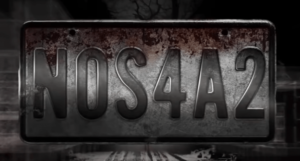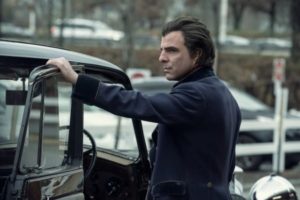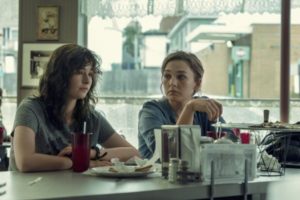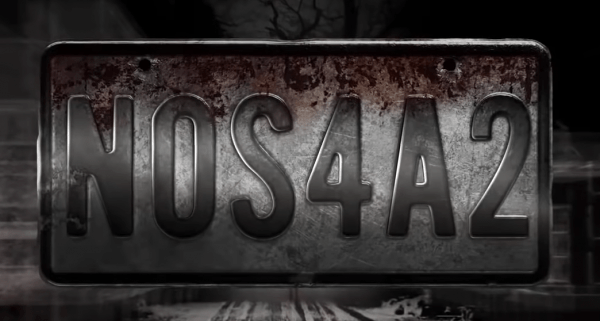Jami O’Brien has written in television for over a decade on shows including Fear the Walking Dead, Hell On Wheels and Flesh and Bone amongst others. As showrunner on NOS4A2 an AMC adaptation of Joe Hill’s novel, she has crafted a supremely nuanced show which concludes its second season this Sunday. Jami recently took time out to talk to Martin Carr about her involvement and why character is everything.

Traditional horror tropes only play a small part in NOS4A2, while the remainder is essentially character driven. How important was that to you?
I approach everything through character and Fear the Walking Dead, which I also worked on with AMC, also dealt with it from that perspective alongside the obvious zombie horror elements. I am only scared if there is some connection to these characters for me, so the most important thing is building that drama between them. That way hopefully we care enough to be afraid when those folks are in danger.
Having been involved from the beginning how did you go about broadening this story in season two?
Early on one of the things I loved about the book was Joe Hill’s (author) implication of a broader universe within his novel. He talks about other strong creatives which is only really a couples of lines, but I think Charlie Manx tells Wayne there are other strong creatives in the universe besides Meg, Maggie and Vic. Some of them are good others not so much and I always loved that because it simply meant there were more stories to tell. Early on in season one we wanted to try setting that up through the Parnassus bar, which is a place where strong villainous creatives would gather. The idea being that we could plant some seeds there which would bear fruit early on in season two. Joe Hill was really excited about it too and had a few ideas about folks we might encounter in there this time round. Out of that he pitched the hourglass man who is another strong creative this season who makes an appearance.
Although the book was adapted for season one, were there any creative addendums which needed tweaking coming into season two?
Those decisions we made in season one certainly had ripple effects going into season two. In some ways this second series adheres more closely to that second section of the book than our first season did to the first section of Joe’s novel. In NOS4A2 the novel begins with Vic McQueen as an eight year old girl, but when she first meets Charlie Manx she is seventeen and then there is a time lapse before we meet her again as an adult with children. For this show we made Vic eighteen which allowed us to embrace that portion of the novel, which I thought was an important part of the story. A decision which would also allow us to go through that journey with the actress who played Vic throughout. It was important to me that we had one actress to play her rather than multiple actors chopping and changing. Once that choice was made other decisions naturally followed on, but by the time we reach season two both versions of Vic have caught up to each other anyway, being essentially the same age on screen and in print.

NOS4A2 combines a stark kitchen sink realism with flamboyant faery tale elements, how did you go about maintaining that delicate balance?
It is something we talked about a lot both in the writers room and setting up season one, alongside Kari Skogland who directed those first two episodes. One way it could have gone was to make that kitchen sink element feel more fantastical, but what we tried to do was ground the fantasy instead. One example of that is the fact you never see our bridge appear or disappear, in some sort of sci-fi special effect. That was done deliberately so that when it’s in the real world this is a real bridge. I think Christmasland is a little more fantastical but it is still grounded in our practical set. There are a lot of working elements to Christmasland, which ultimately make it feel more of a cohesive whole and enable us to wrangle tone throughout.
Just to touch on the casting of Zachary Quinto briefly as Charlie Manx, how collaborative was he in feeding into that role as you went along?
Zach is not only a talented actor but also a class act. We had conversations early on, but even in the discussions prior to him signing on I was telling him everything I thought an actor might want to hear, because I really wanted him to do it. He listened patiently to my explanations around character arc, motivations and everything else in between and then said ‘I’m interested in playing someone really ugly’. I think his initial attraction to the role alongside that juicy character stuff was really the physicality of playing different ages. He worked hard on creating different physical elements and voices for each individual look. That wasn’t something I was honestly expecting and it became such a huge part of the character solely driven by Zach during our collaborative process. So much so that by season two we started incorporating that into our writing, which for me made him a great creative partner.

To what extent do you think Charlie Manx is a tragic character?
That’s a complicated one. I have empathy for Charlie Manx because he comes from humble beginnings and obviously suffered trauma as a child. That said, I think there is a selfishness and pride to him as a character. He is not someone who owns his mistakes but somebody who makes excuses for them to justify his actions. Ultimately I don’t know if that makes him a tragic figure.
Looking more broadly at the position of television today in comparison to cinema, what advantages do you think the small screen has over other mediums?
I think you get to tell so much more story and are afforded more time for a broader exploration of character in television. You just have a lot more room in and it’s a much broader canvas. I have never had the good fortune of working on a feature, having spent my whole career as a writer in television and I love the collaboration it offers.
What are the key considerations which draw you to a project initially?
It is always the characters. Having read the book of NOS4A2 I fell in love with Vic McQueen. So with NOS4A2 it was Vic, with Fear the Walking Dead it was Madison and the Clark family. Then with Hell On Wheels which I worked on prior to that it was Cullen Bohannon, things always start with character for me. If I feel like I want to hang out with these people for twenty plus episodes then I jump on.
Do you think there is room for a third season of NOS4A2 should the opportunity arise?
Absolutely and I think it goes back to your earlier question about expanding this world. I think this is a vast world populated by characters we have already met in our show and others from the novel audiences have yet to encounter from either. I think if there is an appetite for this world then there is scope for expansion.

f you could cross a bridge and go anywhere, where would you go and why?
I guess a world in which things are just and equitable where we have solved a lot of our current problems. Where we have figured out how to take care of people, COVID is controlled and we aren’t on the brink of environmental disaster.
Describe for me your perfect Sunday afternoon.
One in which I get to sleep late. Wake up, have coffee and then read in my pyjamas.
Thank for taking the time to talk to Flickering Myth today and take care.
NOS4A2 concludes this Sunday, August 23rd at 10.00pm PT/ET on AMC.



